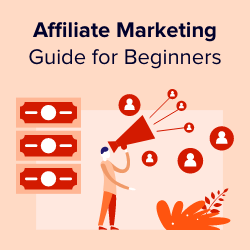The Ultimate Guide to Affiliate Marketing for Beginners
The Ultimate Guide to Affiliate Marketing for Beginners
Congratulations on taking the first step towards learning about affiliate marketing! Whether you are new to the online business world or looking to expand your income streams, this ultimate guide is designed to help beginners like you navigate the exciting realm of affiliate marketing.
In this comprehensive article, you will explore the fundamental concepts, strategies, and tools essential for launching a successful affiliate marketing journey. From understanding the basics to finding profitable niches and promoting products, consider this your go-to resource for unlocking the potential of affiliate marketing and harnessing its unlimited earning possibilities.
Get ready to embark on an adventure that could potentially transform your financial future!
What is Affiliate Marketing?
Affiliate marketing is a business model in which individuals partner with companies to promote their products or services and earn a commission for every customer they refer.
It is a performance-based marketing strategy that allows individuals, commonly known as affiliates or publishers, to earn money by promoting other people’s products or services.
Definition of Affiliate Marketing
Affiliate marketing is a process where affiliates earn a commission for promoting another company’s products or services.
Affiliates share a unique affiliate link or code provided by the company, and when a customer makes a purchase through that link or code, the affiliate earns a commission.
How does Affiliate Marketing work?
Affiliate marketing works in a simple and straightforward manner. When you become an affiliate, you are provided with a unique affiliate link or code that you can share with your audience through various marketing channels.
When someone clicks on your affiliate link and makes a purchase, the company can track that the customer came from your referral, and you earn a commission on the sale.
Benefits of Affiliate Marketing
There are several benefits of affiliate marketing, which make it an attractive option for individuals looking to earn passive income or monetize their online presence.
One of the notable benefits is the opportunity to earn a commission without having to create or manage a product or service.
Affiliate marketing also provides flexibility, as you can work from anywhere and at any time.
It allows you to leverage your existing audience or networks and can be a low-cost business venture, as you can start with minimal investment.
Choosing a Niche
When it comes to affiliate marketing, choosing a profitable niche is essential. A niche refers to a specific segment of the market that you will be targeting with your affiliate promotions.
Here are some steps to help you choose a niche that aligns with your interests and has the potential for profitability.
Identifying your interests and passions
Start by brainstorming your hobbies, interests, and areas of expertise. Which topics excite you the most? What are you passionate about?
Identifying your interests will not only make your affiliate marketing journey more enjoyable but will also allow you to connect better with your target audience.
Researching profitable niches
Once you have a list of potential interests, conduct thorough research to determine which niches are profitable.
Look for niches that have a high demand or are experiencing growth. Consider factors like the size of the target market, the competition level, and the potential for long-term profitability.
Evaluating competition in the chosen niche
Competition is a natural part of any business, and affiliate marketing is no exception. However, it is crucial to assess the level of competition in your chosen niche. Is it saturated with affiliates already?
How to Start a Blog and Make Money
Can you bring a unique angle or value proposition to stand out from the competition? Evaluating the competition will help you understand the challenges you may face and how you can differentiate yourself from others.

This image is property of Amazon.com.
Finding Affiliate Programs
Once you have chosen your niche, it’s time to find affiliate programs that align with your chosen niche and offer products or services that your target audience would be interested in.
Here are some steps to help you find suitable affiliate programs.
Identifying reputable affiliate networks
Affiliate networks act as intermediaries between affiliates and companies offering affiliate programs.
They provide a platform where you can find a wide range of affiliate programs from various companies.
Research reputable affiliate networks that offer programs in your chosen niche. Some popular affiliate networks include Amazon Associates, ClickBank, and ShareASale.
The Ultimate Guide to Affiliate Marketing for Beginners: Researching individual affiliate programs
Take the time to research individual affiliate programs within your chosen niche. Look for programs that have a good reputation, offer high-quality products or services, and provide fair commission rates.
Read reviews or testimonials from other affiliates to get an idea of their experiences with the program.
Evaluating commission structures and payout methods
When considering affiliate programs, pay attention to the commission structure and payout methods.
Some programs offer a flat commission rate, while others provide tiered commission rates based on performance.
Additionally, consider how and when you will receive your commission payments. Some programs pay monthly, while others have a minimum threshold that must be met before payments are made.
Building a Website or Blog

Having a website or blog is an essential aspect of affiliate marketing. It serves as your online platform where you can create valuable content, showcase affiliate products, and engage with your target audience. Here are some steps to help you build a successful website or blog.
Choosing a domain name and web hosting provider
Start by choosing a domain name that is relevant to your niche and easy to remember. Look for a web hosting provider that offers reliable services, good customer support, and fits within your budget. Platforms like WordPress or Wix make it easy to set up and manage your website.
Setting up a user-friendly and visually appealing website
Design your website in a way that is visually appealing and user-friendly. Choose a clean and modern layout, utilize appropriate colors and fonts, and ensure easy navigation. Make sure your website is responsive, meaning it adjusts to different devices and screen sizes.
Creating valuable and engaging content
Content is king in the world of affiliate marketing. Create content that provides value to your audience and aligns with their interests and needs. This could include blog posts, product reviews, tutorials, videos, or podcasts. Regularly update your website with fresh and relevant content to keep your audience engaged and coming back for more.

This image is property of Amazon.com.
Optimizing Your Website for SEO
Search Engine Optimization (SEO) plays a crucial role in driving organic traffic to your website. By optimizing your website for search engines, you increase its visibility in search results, leading to more potential customers discovering your affiliate promotions. Here are some steps to help you optimize your website for SEO.
Conducting keyword research
Keyword research involves identifying the keywords and phrases that your target audience is searching for. Use keyword research tools like Google Keyword Planner or SEMrush to find relevant and high-demand keywords. Incorporate these keywords naturally into your content, including your blog post titles, headings, and throughout the body of your content.
Implementing on-page SEO techniques
On-page SEO techniques involve optimizing various elements on your website to improve its search engine rankings. This includes optimizing your meta tags, URLs, image alt tags, and heading tags. Ensure your website has a clear site structure and is easily accessible by search engine crawlers.
Building high-quality backlinks
Backlinks play a crucial role in SEO. They are links from external websites that point back to your website. Aim to acquire high-quality backlinks from reputable sources in your niche. This can be done through guest posting, participating in online forums or industry communities, and creating valuable content that others naturally want to link to.
Creating Quality Content
As mentioned earlier, creating valuable and engaging content is essential for your affiliate marketing success. Your content should provide value to your audience, help them solve problems, and inspire them to take action. Here are some tips for creating quality content that resonates with your target audience.
Understanding the needs of your target audience
Take the time to understand the needs, challenges, and desires of your target audience. Conduct audience research, engage with them through surveys or polls, and listen to their feedback. By understanding their needs, you can create content that addresses their pain points and provides solutions.
Producing informative and engaging written content
Written content such as blog posts, articles, and guides should be informative, well-researched, and engaging. Use storytelling techniques, relevant examples, and expertise to capture your audience’s attention. Break down complex topics into easy-to-understand concepts and provide actionable tips or advice.
Incorporating multimedia elements into your content
Make your content more visually appealing and engaging by incorporating multimedia elements. This can include images, infographics, videos, or audio clips. Visuals help break up text, make your content more shareable, and enhance the overall user experience.

This image is property of miro.medium.com.
Promoting Affiliate Products
Once you have created valuable content and joined affiliate programs, it’s time to promote the affiliate products or services to your target audience. Here are some effective ways to promote affiliate products.
Building an email list and utilizing email marketing
Building an email list allows you to directly communicate with your audience and promote affiliate products or services. Offer valuable lead magnets or incentives in exchange for their email addresses. Send regular newsletters or promotional emails highlighting relevant affiliate products or exclusive discounts.
Leveraging social media platforms for promotion
Utilize social media platforms like Facebook, Instagram, Twitter, or LinkedIn to promote affiliate products. Create engaging posts, share informative content, and leverage the power of hashtags and influencers to expand your reach. Engage with your audience, answer questions, and provide valuable insights to build trust and credibility.
Creating product reviews and recommendations
Write detailed and unbiased product reviews or recommendations on your website or blog. Share your personal experience with the product, highlight its key features and benefits, and provide your honest opinion. This helps your audience make informed purchasing decisions and increases the likelihood of them using your affiliate link to make a purchase.
Driving Organic Traffic
Driving organic traffic to your website is crucial for affiliate marketing success. Organic traffic refers to visitors who find your website through search engine results or other non-paid channels. Here are some strategies to drive organic traffic to your website.
Implementing effective content marketing strategies
Content marketing involves creating and distributing valuable content to attract and engage your target audience. Publish high-quality blog posts, optimize your content for SEO, and promote it through various online channels. Guest posting on reputable websites, participating in industry communities, and being active on social media can also help drive organic traffic.
Utilizing social media marketing techniques
Leverage social media platforms to engage with your audience and drive traffic to your website. Regularly share your content, utilize relevant hashtags, and engage with your followers by responding to comments or messages. Collaborate with influencers or partner with other businesses in your niche to expand your reach.
Optimizing your website for search engine visibility
Ensure your website is optimized for search engines to improve its visibility in search results. Implement SEO techniques like keyword optimization, meta tag optimization, and backlink building. Regularly update your website with fresh and relevant content to keep search engines indexing your website.

This image is property of www.wpbeginner.com.
Analyzing and Tracking Performance
Analyzing and tracking the performance of your affiliate marketing efforts is crucial for optimizing your strategies and maximizing your earnings. Here are some ways to analyze and track your performance.
Using analytics tools to monitor website traffic and conversions
Set up and utilize website analytics tools like Google Analytics to monitor your website’s performance. Track metrics such as website traffic, visitor demographics, popular content, and conversion rates. Analyze this data to identify trends, understand your audience’s behavior, and make data-driven decisions.
Tracking affiliate links and click-through rates
Most affiliate programs provide tracking tools or dashboards that allow you to track and monitor your referral links’ performance. Monitor your click-through rates, conversion rates, and earnings for each affiliate product. This will help you identify which products or promotional strategies are most effective and adjust your marketing efforts accordingly.
Adjusting marketing strategies based on performance data
Based on the performance data you gather, continuously evaluate and adjust your marketing strategies. Experiment with different promotional techniques, content formats, or affiliate products. An iterative approach allows you to optimize your strategies and focus on what drives the best results.
Building Relationships with Affiliate Managers and Marketers
Building relationships with affiliate managers and marketers can provide valuable support, guidance, and networking opportunities. Here are some ways to build relationships within the affiliate marketing community.
Regularly communicating with affiliate managers for support and guidance
Reach out and establish a connection with the affiliate managers of the programs you are promoting. They can provide valuable insights about the products, offer promotional materials, or assist with any questions or issues you may have. Regularly communicate with them to stay up-to-date with the latest promotions or opportunities.
Engaging with other affiliate marketers to learn from their experiences
Networking with other affiliate marketers allows you to learn from their experiences, share insights, and collaborate on joint ventures. Join online affiliate marketing communities, participate in forums, or attend industry events to connect with like-minded individuals.
Participating in industry forums and events
Engaging in industry forums, webinars, conferences, or events provides opportunities to learn from industry experts, stay updated with the latest trends, and build valuable connections. Contribute to discussions, ask questions, and share your own experiences to establish yourself as an active participant in the affiliate marketing community.
Affiliate Marketing For Beginners: What It Is + How to Succeed
In conclusion, affiliate marketing offers a lucrative and flexible opportunity for individuals looking to earn money online. By choosing a profitable niche, finding reputable affiliate programs, building a user-friendly website, creating valuable content, promoting affiliate products effectively, and optimizing for SEO, you can increase your chances of success in the world of affiliate marketing. Remember to track and analyze your performance, adjust your strategies if needed, and build relationships within the affiliate marketing community to maximize your earnings and continuously improve. Happy affiliate marketing!

This image is property of www.wpbeginner.com.


